Essay: Aboriginal Health, Historical Context, and Contemporary Issues
VerifiedAdded on 2022/08/19
|8
|1926
|14
Essay
AI Summary
This essay delves into the historical and social contexts of Aboriginal health in Australia, using the 'What? So What? Now What?' reflective model. The essay begins with an overview of key historical events, such as colonization, land dispossession, and the Stolen Generations, that have profoundly impacted Aboriginal health and wellbeing. It details the effects of these events, including the introduction of diseases, systemic racism, discrimination in healthcare, and the ongoing challenges related to mental health, chronic diseases, and alcohol abuse. The essay then reflects on these issues, particularly in the context of healthcare, exploring concepts like cultural competency and the need for culturally safe care. The author discusses personal shifts in understanding and the importance of addressing barriers to culturally respectful services. Finally, the essay outlines actionable steps for healthcare professionals, including fostering partnerships with Aboriginal services, improving workforce diversity, and prioritizing cultural sensitivity to improve health outcomes and promote a more equitable healthcare system for Aboriginal communities. The essay references multiple scholarly articles to support its claims.
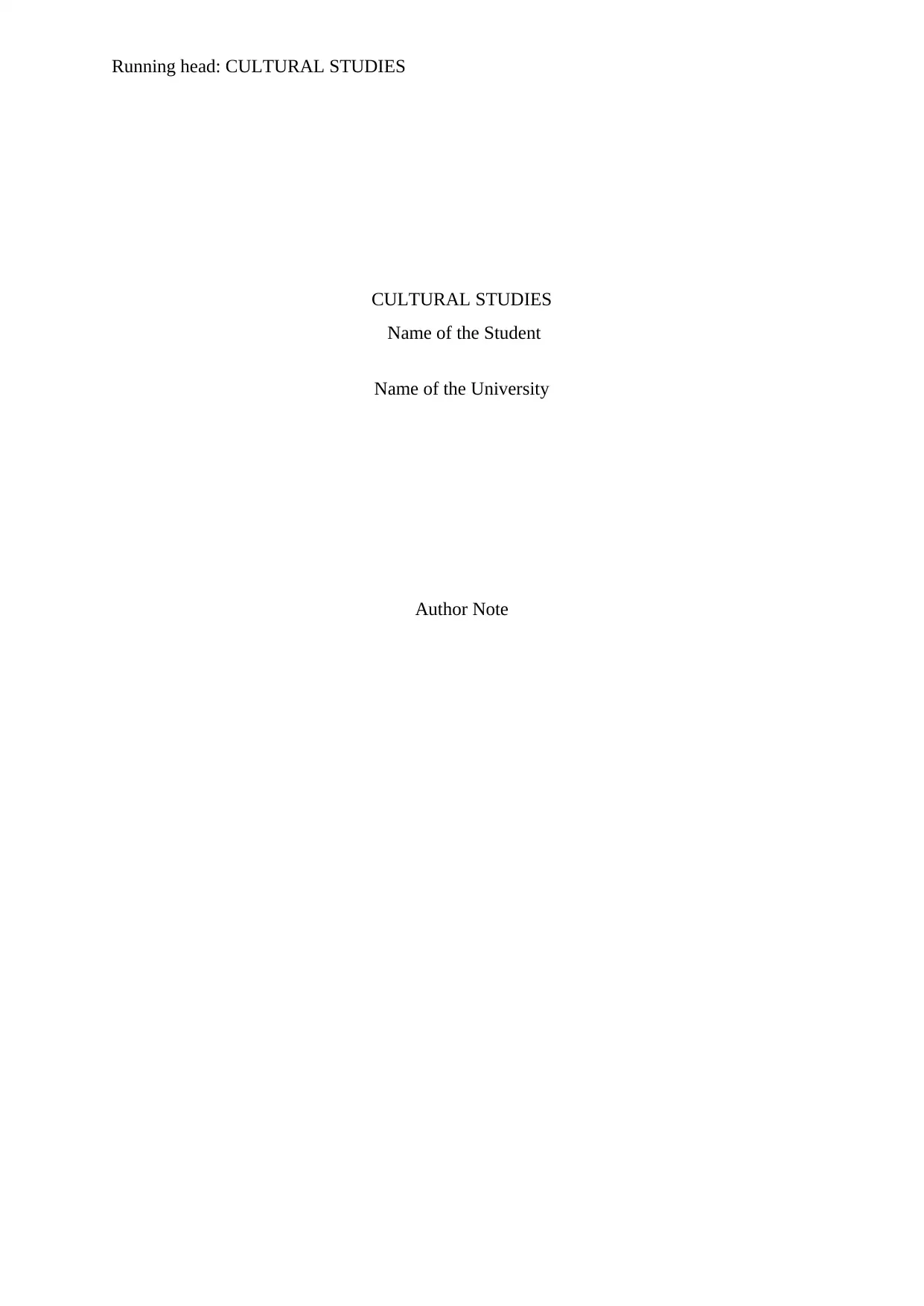
Running head: CULTURAL STUDIES
CULTURAL STUDIES
Name of the Student
Name of the University
Author Note
CULTURAL STUDIES
Name of the Student
Name of the University
Author Note
Paraphrase This Document
Need a fresh take? Get an instant paraphrase of this document with our AI Paraphraser
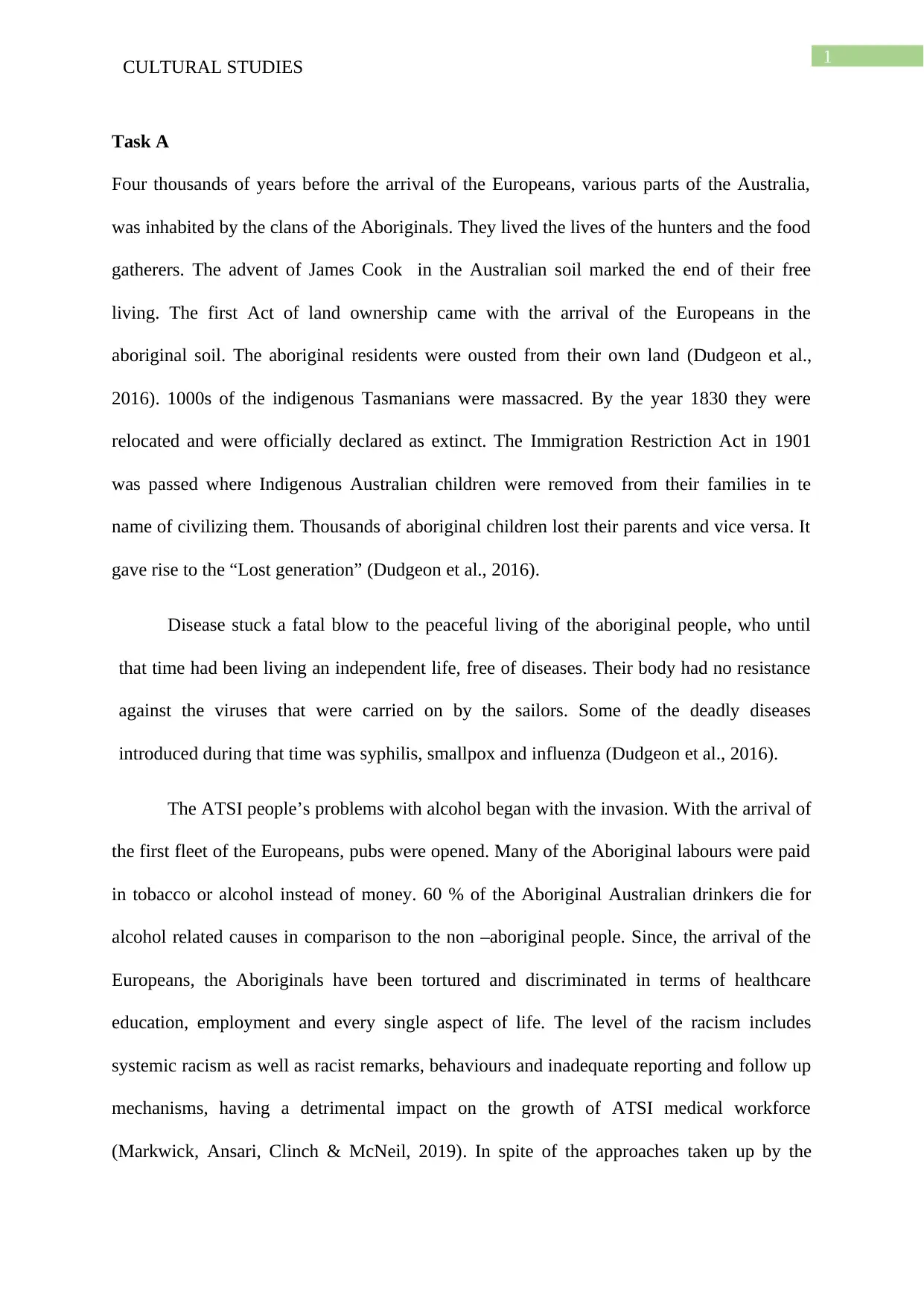
1
CULTURAL STUDIES
Task A
Four thousands of years before the arrival of the Europeans, various parts of the Australia,
was inhabited by the clans of the Aboriginals. They lived the lives of the hunters and the food
gatherers. The advent of James Cook in the Australian soil marked the end of their free
living. The first Act of land ownership came with the arrival of the Europeans in the
aboriginal soil. The aboriginal residents were ousted from their own land (Dudgeon et al.,
2016). 1000s of the indigenous Tasmanians were massacred. By the year 1830 they were
relocated and were officially declared as extinct. The Immigration Restriction Act in 1901
was passed where Indigenous Australian children were removed from their families in te
name of civilizing them. Thousands of aboriginal children lost their parents and vice versa. It
gave rise to the “Lost generation” (Dudgeon et al., 2016).
Disease stuck a fatal blow to the peaceful living of the aboriginal people, who until
that time had been living an independent life, free of diseases. Their body had no resistance
against the viruses that were carried on by the sailors. Some of the deadly diseases
introduced during that time was syphilis, smallpox and influenza (Dudgeon et al., 2016).
The ATSI people’s problems with alcohol began with the invasion. With the arrival of
the first fleet of the Europeans, pubs were opened. Many of the Aboriginal labours were paid
in tobacco or alcohol instead of money. 60 % of the Aboriginal Australian drinkers die for
alcohol related causes in comparison to the non –aboriginal people. Since, the arrival of the
Europeans, the Aboriginals have been tortured and discriminated in terms of healthcare
education, employment and every single aspect of life. The level of the racism includes
systemic racism as well as racist remarks, behaviours and inadequate reporting and follow up
mechanisms, having a detrimental impact on the growth of ATSI medical workforce
(Markwick, Ansari, Clinch & McNeil, 2019). In spite of the approaches taken up by the
CULTURAL STUDIES
Task A
Four thousands of years before the arrival of the Europeans, various parts of the Australia,
was inhabited by the clans of the Aboriginals. They lived the lives of the hunters and the food
gatherers. The advent of James Cook in the Australian soil marked the end of their free
living. The first Act of land ownership came with the arrival of the Europeans in the
aboriginal soil. The aboriginal residents were ousted from their own land (Dudgeon et al.,
2016). 1000s of the indigenous Tasmanians were massacred. By the year 1830 they were
relocated and were officially declared as extinct. The Immigration Restriction Act in 1901
was passed where Indigenous Australian children were removed from their families in te
name of civilizing them. Thousands of aboriginal children lost their parents and vice versa. It
gave rise to the “Lost generation” (Dudgeon et al., 2016).
Disease stuck a fatal blow to the peaceful living of the aboriginal people, who until
that time had been living an independent life, free of diseases. Their body had no resistance
against the viruses that were carried on by the sailors. Some of the deadly diseases
introduced during that time was syphilis, smallpox and influenza (Dudgeon et al., 2016).
The ATSI people’s problems with alcohol began with the invasion. With the arrival of
the first fleet of the Europeans, pubs were opened. Many of the Aboriginal labours were paid
in tobacco or alcohol instead of money. 60 % of the Aboriginal Australian drinkers die for
alcohol related causes in comparison to the non –aboriginal people. Since, the arrival of the
Europeans, the Aboriginals have been tortured and discriminated in terms of healthcare
education, employment and every single aspect of life. The level of the racism includes
systemic racism as well as racist remarks, behaviours and inadequate reporting and follow up
mechanisms, having a detrimental impact on the growth of ATSI medical workforce
(Markwick, Ansari, Clinch & McNeil, 2019). In spite of the approaches taken up by the
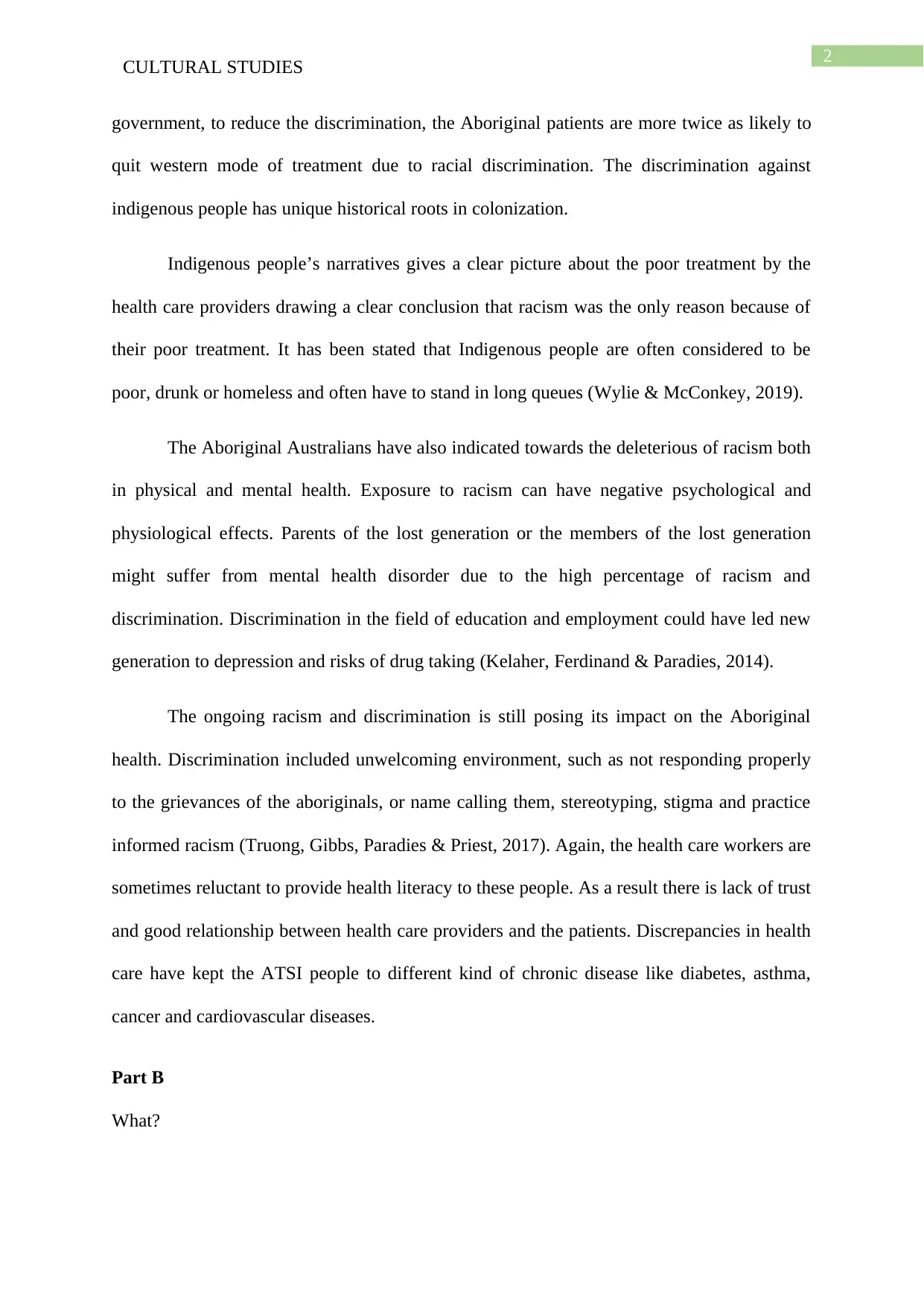
2
CULTURAL STUDIES
government, to reduce the discrimination, the Aboriginal patients are more twice as likely to
quit western mode of treatment due to racial discrimination. The discrimination against
indigenous people has unique historical roots in colonization.
Indigenous people’s narratives gives a clear picture about the poor treatment by the
health care providers drawing a clear conclusion that racism was the only reason because of
their poor treatment. It has been stated that Indigenous people are often considered to be
poor, drunk or homeless and often have to stand in long queues (Wylie & McConkey, 2019).
The Aboriginal Australians have also indicated towards the deleterious of racism both
in physical and mental health. Exposure to racism can have negative psychological and
physiological effects. Parents of the lost generation or the members of the lost generation
might suffer from mental health disorder due to the high percentage of racism and
discrimination. Discrimination in the field of education and employment could have led new
generation to depression and risks of drug taking (Kelaher, Ferdinand & Paradies, 2014).
The ongoing racism and discrimination is still posing its impact on the Aboriginal
health. Discrimination included unwelcoming environment, such as not responding properly
to the grievances of the aboriginals, or name calling them, stereotyping, stigma and practice
informed racism (Truong, Gibbs, Paradies & Priest, 2017). Again, the health care workers are
sometimes reluctant to provide health literacy to these people. As a result there is lack of trust
and good relationship between health care providers and the patients. Discrepancies in health
care have kept the ATSI people to different kind of chronic disease like diabetes, asthma,
cancer and cardiovascular diseases.
Part B
What?
CULTURAL STUDIES
government, to reduce the discrimination, the Aboriginal patients are more twice as likely to
quit western mode of treatment due to racial discrimination. The discrimination against
indigenous people has unique historical roots in colonization.
Indigenous people’s narratives gives a clear picture about the poor treatment by the
health care providers drawing a clear conclusion that racism was the only reason because of
their poor treatment. It has been stated that Indigenous people are often considered to be
poor, drunk or homeless and often have to stand in long queues (Wylie & McConkey, 2019).
The Aboriginal Australians have also indicated towards the deleterious of racism both
in physical and mental health. Exposure to racism can have negative psychological and
physiological effects. Parents of the lost generation or the members of the lost generation
might suffer from mental health disorder due to the high percentage of racism and
discrimination. Discrimination in the field of education and employment could have led new
generation to depression and risks of drug taking (Kelaher, Ferdinand & Paradies, 2014).
The ongoing racism and discrimination is still posing its impact on the Aboriginal
health. Discrimination included unwelcoming environment, such as not responding properly
to the grievances of the aboriginals, or name calling them, stereotyping, stigma and practice
informed racism (Truong, Gibbs, Paradies & Priest, 2017). Again, the health care workers are
sometimes reluctant to provide health literacy to these people. As a result there is lack of trust
and good relationship between health care providers and the patients. Discrepancies in health
care have kept the ATSI people to different kind of chronic disease like diabetes, asthma,
cancer and cardiovascular diseases.
Part B
What?
⊘ This is a preview!⊘
Do you want full access?
Subscribe today to unlock all pages.

Trusted by 1+ million students worldwide
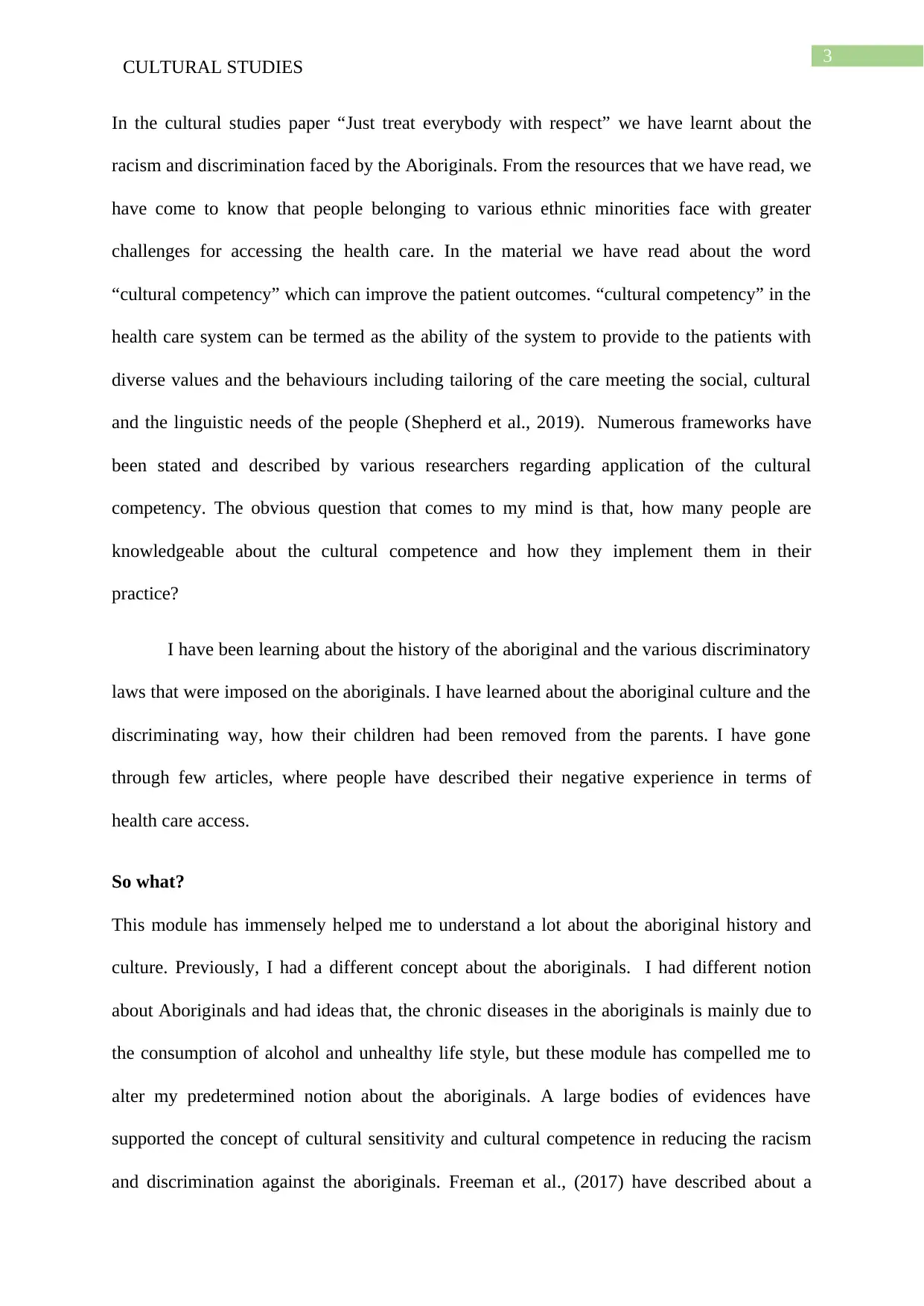
3
CULTURAL STUDIES
In the cultural studies paper “Just treat everybody with respect” we have learnt about the
racism and discrimination faced by the Aboriginals. From the resources that we have read, we
have come to know that people belonging to various ethnic minorities face with greater
challenges for accessing the health care. In the material we have read about the word
“cultural competency” which can improve the patient outcomes. “cultural competency” in the
health care system can be termed as the ability of the system to provide to the patients with
diverse values and the behaviours including tailoring of the care meeting the social, cultural
and the linguistic needs of the people (Shepherd et al., 2019). Numerous frameworks have
been stated and described by various researchers regarding application of the cultural
competency. The obvious question that comes to my mind is that, how many people are
knowledgeable about the cultural competence and how they implement them in their
practice?
I have been learning about the history of the aboriginal and the various discriminatory
laws that were imposed on the aboriginals. I have learned about the aboriginal culture and the
discriminating way, how their children had been removed from the parents. I have gone
through few articles, where people have described their negative experience in terms of
health care access.
So what?
This module has immensely helped me to understand a lot about the aboriginal history and
culture. Previously, I had a different concept about the aboriginals. I had different notion
about Aboriginals and had ideas that, the chronic diseases in the aboriginals is mainly due to
the consumption of alcohol and unhealthy life style, but these module has compelled me to
alter my predetermined notion about the aboriginals. A large bodies of evidences have
supported the concept of cultural sensitivity and cultural competence in reducing the racism
and discrimination against the aboriginals. Freeman et al., (2017) have described about a
CULTURAL STUDIES
In the cultural studies paper “Just treat everybody with respect” we have learnt about the
racism and discrimination faced by the Aboriginals. From the resources that we have read, we
have come to know that people belonging to various ethnic minorities face with greater
challenges for accessing the health care. In the material we have read about the word
“cultural competency” which can improve the patient outcomes. “cultural competency” in the
health care system can be termed as the ability of the system to provide to the patients with
diverse values and the behaviours including tailoring of the care meeting the social, cultural
and the linguistic needs of the people (Shepherd et al., 2019). Numerous frameworks have
been stated and described by various researchers regarding application of the cultural
competency. The obvious question that comes to my mind is that, how many people are
knowledgeable about the cultural competence and how they implement them in their
practice?
I have been learning about the history of the aboriginal and the various discriminatory
laws that were imposed on the aboriginals. I have learned about the aboriginal culture and the
discriminating way, how their children had been removed from the parents. I have gone
through few articles, where people have described their negative experience in terms of
health care access.
So what?
This module has immensely helped me to understand a lot about the aboriginal history and
culture. Previously, I had a different concept about the aboriginals. I had different notion
about Aboriginals and had ideas that, the chronic diseases in the aboriginals is mainly due to
the consumption of alcohol and unhealthy life style, but these module has compelled me to
alter my predetermined notion about the aboriginals. A large bodies of evidences have
supported the concept of cultural sensitivity and cultural competence in reducing the racism
and discrimination against the aboriginals. Freeman et al., (2017) have described about a
Paraphrase This Document
Need a fresh take? Get an instant paraphrase of this document with our AI Paraphraser
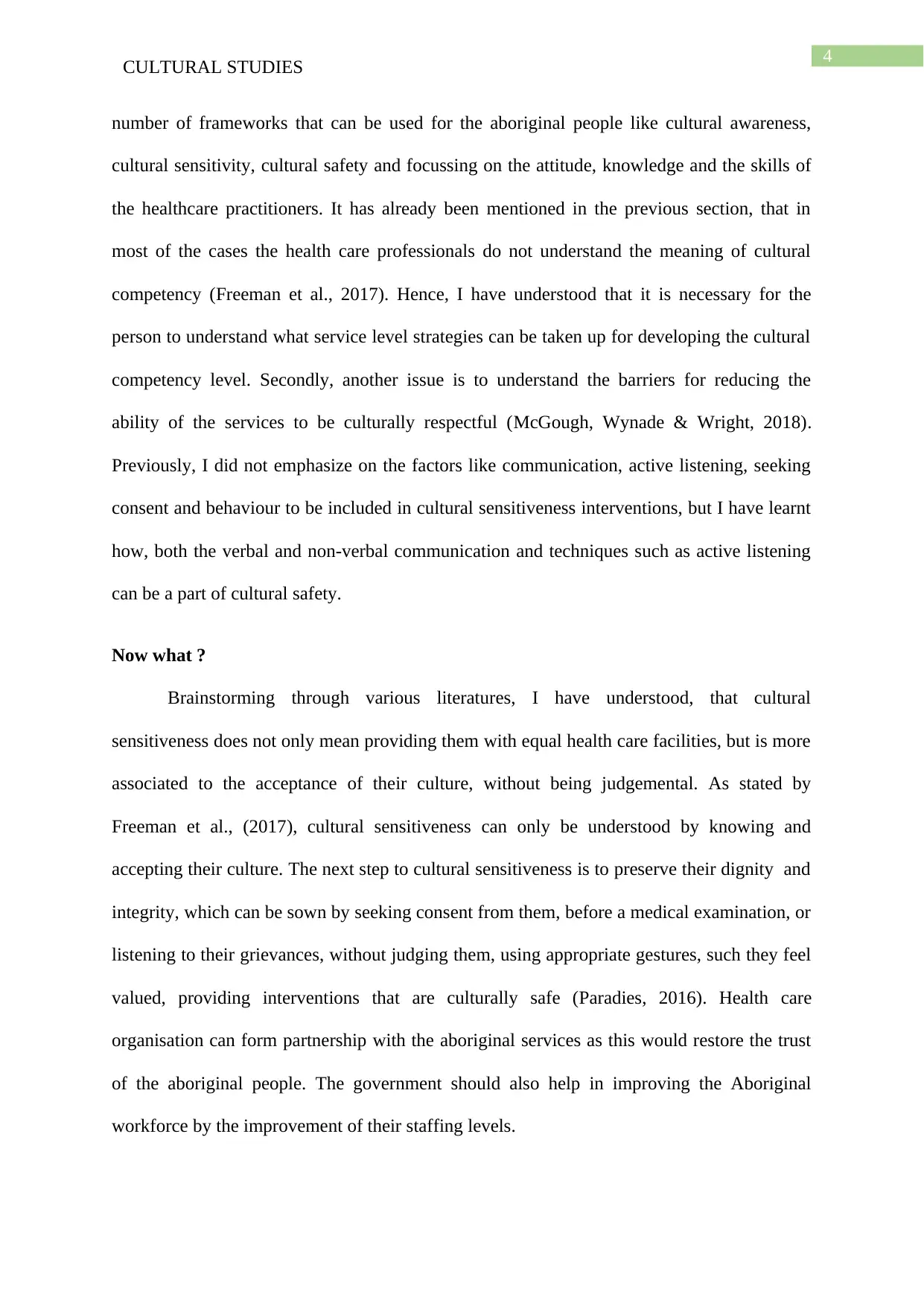
4
CULTURAL STUDIES
number of frameworks that can be used for the aboriginal people like cultural awareness,
cultural sensitivity, cultural safety and focussing on the attitude, knowledge and the skills of
the healthcare practitioners. It has already been mentioned in the previous section, that in
most of the cases the health care professionals do not understand the meaning of cultural
competency (Freeman et al., 2017). Hence, I have understood that it is necessary for the
person to understand what service level strategies can be taken up for developing the cultural
competency level. Secondly, another issue is to understand the barriers for reducing the
ability of the services to be culturally respectful (McGough, Wynade & Wright, 2018).
Previously, I did not emphasize on the factors like communication, active listening, seeking
consent and behaviour to be included in cultural sensitiveness interventions, but I have learnt
how, both the verbal and non-verbal communication and techniques such as active listening
can be a part of cultural safety.
Now what ?
Brainstorming through various literatures, I have understood, that cultural
sensitiveness does not only mean providing them with equal health care facilities, but is more
associated to the acceptance of their culture, without being judgemental. As stated by
Freeman et al., (2017), cultural sensitiveness can only be understood by knowing and
accepting their culture. The next step to cultural sensitiveness is to preserve their dignity and
integrity, which can be sown by seeking consent from them, before a medical examination, or
listening to their grievances, without judging them, using appropriate gestures, such they feel
valued, providing interventions that are culturally safe (Paradies, 2016). Health care
organisation can form partnership with the aboriginal services as this would restore the trust
of the aboriginal people. The government should also help in improving the Aboriginal
workforce by the improvement of their staffing levels.
CULTURAL STUDIES
number of frameworks that can be used for the aboriginal people like cultural awareness,
cultural sensitivity, cultural safety and focussing on the attitude, knowledge and the skills of
the healthcare practitioners. It has already been mentioned in the previous section, that in
most of the cases the health care professionals do not understand the meaning of cultural
competency (Freeman et al., 2017). Hence, I have understood that it is necessary for the
person to understand what service level strategies can be taken up for developing the cultural
competency level. Secondly, another issue is to understand the barriers for reducing the
ability of the services to be culturally respectful (McGough, Wynade & Wright, 2018).
Previously, I did not emphasize on the factors like communication, active listening, seeking
consent and behaviour to be included in cultural sensitiveness interventions, but I have learnt
how, both the verbal and non-verbal communication and techniques such as active listening
can be a part of cultural safety.
Now what ?
Brainstorming through various literatures, I have understood, that cultural
sensitiveness does not only mean providing them with equal health care facilities, but is more
associated to the acceptance of their culture, without being judgemental. As stated by
Freeman et al., (2017), cultural sensitiveness can only be understood by knowing and
accepting their culture. The next step to cultural sensitiveness is to preserve their dignity and
integrity, which can be sown by seeking consent from them, before a medical examination, or
listening to their grievances, without judging them, using appropriate gestures, such they feel
valued, providing interventions that are culturally safe (Paradies, 2016). Health care
organisation can form partnership with the aboriginal services as this would restore the trust
of the aboriginal people. The government should also help in improving the Aboriginal
workforce by the improvement of their staffing levels.
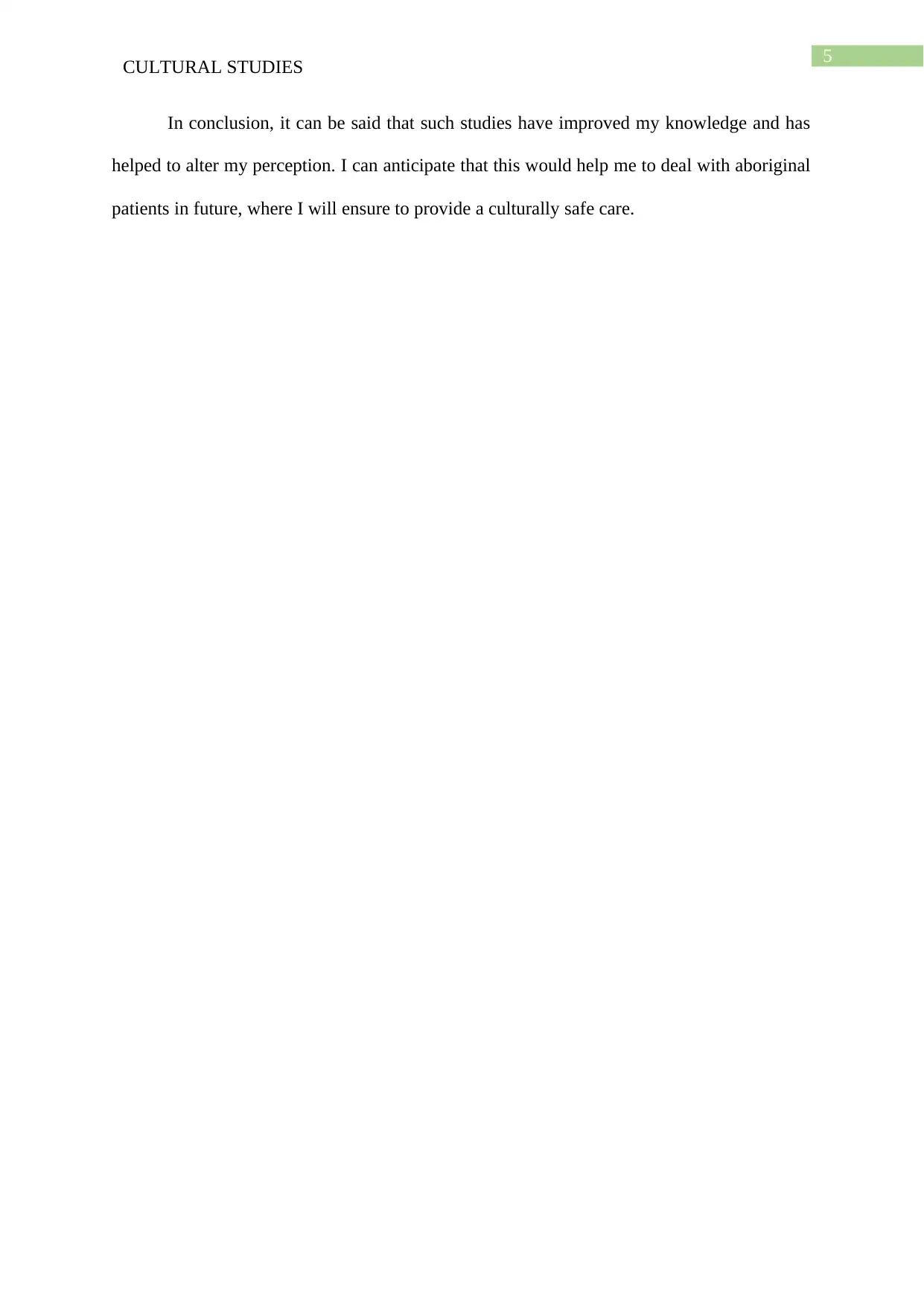
5
CULTURAL STUDIES
In conclusion, it can be said that such studies have improved my knowledge and has
helped to alter my perception. I can anticipate that this would help me to deal with aboriginal
patients in future, where I will ensure to provide a culturally safe care.
CULTURAL STUDIES
In conclusion, it can be said that such studies have improved my knowledge and has
helped to alter my perception. I can anticipate that this would help me to deal with aboriginal
patients in future, where I will ensure to provide a culturally safe care.
⊘ This is a preview!⊘
Do you want full access?
Subscribe today to unlock all pages.

Trusted by 1+ million students worldwide
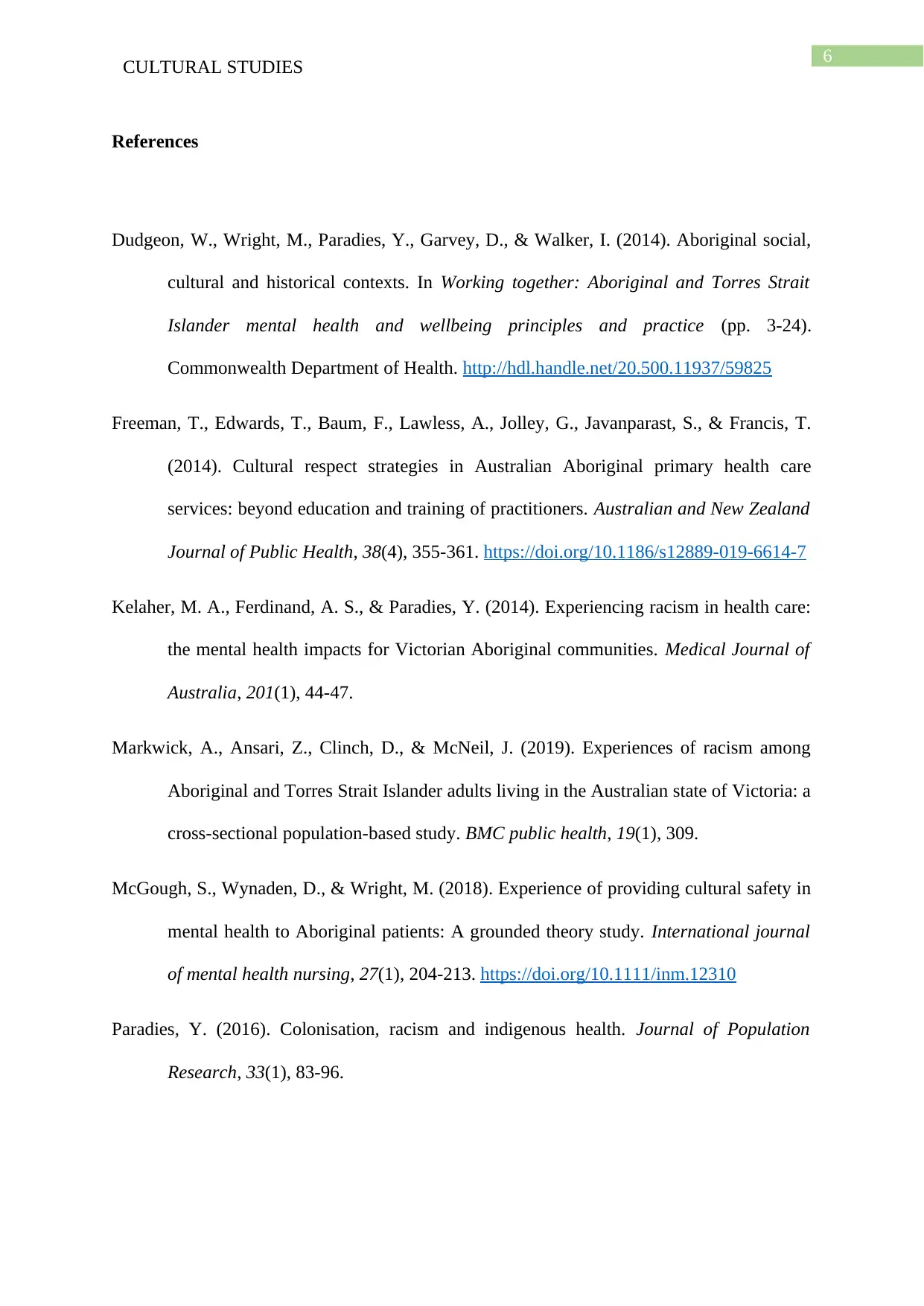
6
CULTURAL STUDIES
References
Dudgeon, W., Wright, M., Paradies, Y., Garvey, D., & Walker, I. (2014). Aboriginal social,
cultural and historical contexts. In Working together: Aboriginal and Torres Strait
Islander mental health and wellbeing principles and practice (pp. 3-24).
Commonwealth Department of Health. http://hdl.handle.net/20.500.11937/59825
Freeman, T., Edwards, T., Baum, F., Lawless, A., Jolley, G., Javanparast, S., & Francis, T.
(2014). Cultural respect strategies in Australian Aboriginal primary health care
services: beyond education and training of practitioners. Australian and New Zealand
Journal of Public Health, 38(4), 355-361. https://doi.org/10.1186/s12889-019-6614-7
Kelaher, M. A., Ferdinand, A. S., & Paradies, Y. (2014). Experiencing racism in health care:
the mental health impacts for Victorian Aboriginal communities. Medical Journal of
Australia, 201(1), 44-47.
Markwick, A., Ansari, Z., Clinch, D., & McNeil, J. (2019). Experiences of racism among
Aboriginal and Torres Strait Islander adults living in the Australian state of Victoria: a
cross-sectional population-based study. BMC public health, 19(1), 309.
McGough, S., Wynaden, D., & Wright, M. (2018). Experience of providing cultural safety in
mental health to Aboriginal patients: A grounded theory study. International journal
of mental health nursing, 27(1), 204-213. https://doi.org/10.1111/inm.12310
Paradies, Y. (2016). Colonisation, racism and indigenous health. Journal of Population
Research, 33(1), 83-96.
CULTURAL STUDIES
References
Dudgeon, W., Wright, M., Paradies, Y., Garvey, D., & Walker, I. (2014). Aboriginal social,
cultural and historical contexts. In Working together: Aboriginal and Torres Strait
Islander mental health and wellbeing principles and practice (pp. 3-24).
Commonwealth Department of Health. http://hdl.handle.net/20.500.11937/59825
Freeman, T., Edwards, T., Baum, F., Lawless, A., Jolley, G., Javanparast, S., & Francis, T.
(2014). Cultural respect strategies in Australian Aboriginal primary health care
services: beyond education and training of practitioners. Australian and New Zealand
Journal of Public Health, 38(4), 355-361. https://doi.org/10.1186/s12889-019-6614-7
Kelaher, M. A., Ferdinand, A. S., & Paradies, Y. (2014). Experiencing racism in health care:
the mental health impacts for Victorian Aboriginal communities. Medical Journal of
Australia, 201(1), 44-47.
Markwick, A., Ansari, Z., Clinch, D., & McNeil, J. (2019). Experiences of racism among
Aboriginal and Torres Strait Islander adults living in the Australian state of Victoria: a
cross-sectional population-based study. BMC public health, 19(1), 309.
McGough, S., Wynaden, D., & Wright, M. (2018). Experience of providing cultural safety in
mental health to Aboriginal patients: A grounded theory study. International journal
of mental health nursing, 27(1), 204-213. https://doi.org/10.1111/inm.12310
Paradies, Y. (2016). Colonisation, racism and indigenous health. Journal of Population
Research, 33(1), 83-96.
Paraphrase This Document
Need a fresh take? Get an instant paraphrase of this document with our AI Paraphraser
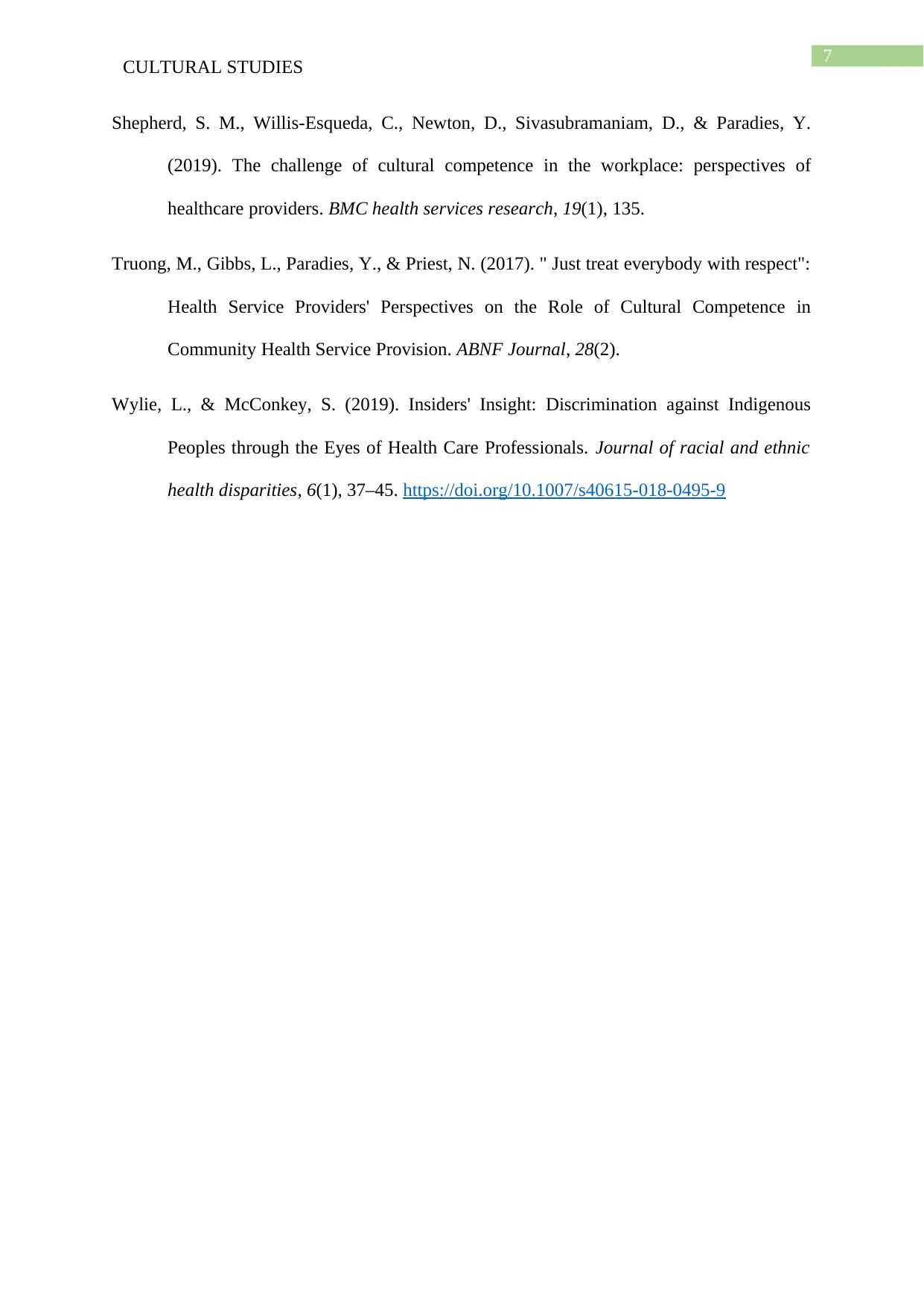
7
CULTURAL STUDIES
Shepherd, S. M., Willis-Esqueda, C., Newton, D., Sivasubramaniam, D., & Paradies, Y.
(2019). The challenge of cultural competence in the workplace: perspectives of
healthcare providers. BMC health services research, 19(1), 135.
Truong, M., Gibbs, L., Paradies, Y., & Priest, N. (2017). " Just treat everybody with respect":
Health Service Providers' Perspectives on the Role of Cultural Competence in
Community Health Service Provision. ABNF Journal, 28(2).
Wylie, L., & McConkey, S. (2019). Insiders' Insight: Discrimination against Indigenous
Peoples through the Eyes of Health Care Professionals. Journal of racial and ethnic
health disparities, 6(1), 37–45. https://doi.org/10.1007/s40615-018-0495-9
CULTURAL STUDIES
Shepherd, S. M., Willis-Esqueda, C., Newton, D., Sivasubramaniam, D., & Paradies, Y.
(2019). The challenge of cultural competence in the workplace: perspectives of
healthcare providers. BMC health services research, 19(1), 135.
Truong, M., Gibbs, L., Paradies, Y., & Priest, N. (2017). " Just treat everybody with respect":
Health Service Providers' Perspectives on the Role of Cultural Competence in
Community Health Service Provision. ABNF Journal, 28(2).
Wylie, L., & McConkey, S. (2019). Insiders' Insight: Discrimination against Indigenous
Peoples through the Eyes of Health Care Professionals. Journal of racial and ethnic
health disparities, 6(1), 37–45. https://doi.org/10.1007/s40615-018-0495-9
1 out of 8
Related Documents
Your All-in-One AI-Powered Toolkit for Academic Success.
+13062052269
info@desklib.com
Available 24*7 on WhatsApp / Email
![[object Object]](/_next/static/media/star-bottom.7253800d.svg)
Unlock your academic potential
Copyright © 2020–2026 A2Z Services. All Rights Reserved. Developed and managed by ZUCOL.




